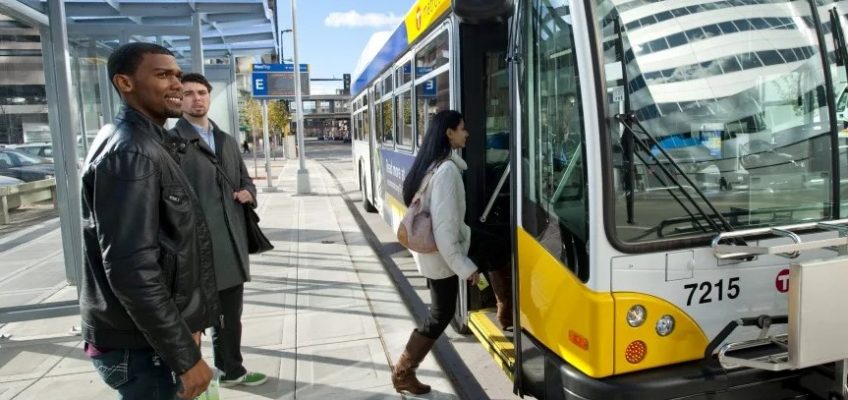Metro Transit fares will be lowered and simplified starting Jan. 1.
The changes, approved by the Met Council on Wednesday, include:
• Making full-price fares on all Metro Transit non-express buses and light rail $2 all day, every day. The service will be $1 all day, every day for youth, seniors and Medicare recipients. These fares currently increase to $2.50 on non-express buses and light rail during rush hours.
• Reducing the cost of Metro Transit’s All-Day pass to $2 to $4 and 7-Day pass to $20. Full-price All-Day passes currently cost $4 to $5 and 7-Day passes cost $24, according to the Metro Transit website. The passes are for riders planning to take multiple trips.
• The changes also permit Metro Mobility-certified riders to ride Metro Transit and other regional transit providers for one-cent fares through June 30, 2025. This pilot program will inform future fare policy discussions, according to the press release.
Metro Mobility riders
Throughout this year, Metro Mobility-certified riders can board any Metro Transit regular route bus or train for free, according to the Met Council website. The free fare, which was authorized by the 2023 state transportation bill, was set to end Dec. 31 of this year.
Prior to the free fare pilot, Metro Mobility-certified riders using regular route transit paid the $1 mobility fare, according to Metro Transit spokesperson Drew Kerr. By law, the Met Council can set reduced fares but not waive them entirely which is why it will be set at one cent until there can be further fare policy discussion, according to Kerr.
Later in 2025, those who qualify for the income-based Transit Assistance Program will pay $1 fares for up to two years before needing to re-apply. Currently, the discount must be renewed after one year.
The cost of lowering fares will be offset in part by the more than 926,000 more rides that are expected as a result of the fare changes, according to the release. It is the first fare change for Metro Transit since 2017, when full-priced fares for non-express regular route buses and light rail increased from $1.75 to $2, according to Kerr.
All-day service
Prior to the pandemic, riders generally used transit coming to and from work, Kerr said. Now, Metro Transit is seeing consistent ridership throughout the day and week, Kerr said.
“So we’re reorienting our service to provide more all-day service in busy corridors across the region. And similarly, these fare changes reflect the way that people travel now, which is throughout the day, every day of the week,” Kerr said.
Metro Transit is seeing strong ridership in corridors with bus rapid transit service, according to Kerr. In order to speed up service, Metro Transit is in part moving fare collection off of vehicles and adjusting its services to the changes in ridership, Kerr said.
“And so that’s the direction that our service is moving in, and that is also reflected in the elimination of the peak charges that historically were applied in recognition that we had really busy times in the morning and afternoon when people were using transit more for commute purposes,” Kerr said.
An 8% increase in ridership from last year
Metro Transit has provided more than 35.8 million rides through the end of September, an 8% increase compared to the same time last year.
In the next coming years, Metro Transit also is upgrading its fare collection equipment systemwide for the first time in 20 years which will allow riders to purchase fares by tapping their mobile phones or credit cards.
“Making transit easier to use is key to growing ridership, and we believe simplifying fares will help do just that,” said Metro Transit General Manager Lesley Kandaras in the press release. “These changes also support our belief that cost should not be a barrier for those who want or need access to our services.”
To learn more about Metro Transit’s draft service improvement plan, go to metrotransit.org/network-now. Comments on that plan are being accepted through Friday.
Related Articles
Additional improvements could come to South Robert Street; community invited to weigh in on Nov. 19
Metro Transit to extend Gold Line to downtown Minneapolis in 2027
Twin Cities’ Transit Link suburban/rural bus service now trackable online
Metro Transit police chief, previously on leave from department, now out
Metro Transit seeks to expand service by 35% through 2027. Here’s the new routes.


Leave a Reply